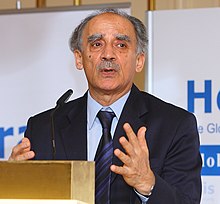
Rashtriya Swayamsevak Sangh is an Indian right-wing, Hindu nationalist volunteer paramilitary organisation. It is the progenitor and leader of a large body of organisations called the Sangh Parivar, which has developed a presence in all facets of Indian society and includes the Bharatiya Janata Party, the ruling political party under Narendra Modi, the 14th prime minister of India. Mohan Bhagwat has served as the Sarsanghchalak of the RSS since March 2009.
Hindutva is a political ideology encompassing the cultural justification of Hindu nationalism and the belief in establishing Hindu hegemony within India. The political ideology was formulated by Vinayak Damodar Savarkar in 1922. It is used by the Rashtriya Swayamsevak Sangh (RSS), the Vishva Hindu Parishad (VHP), the current ruling Bharatiya Janata Party (BJP), and other organisations, collectively called the Sangh Parivar.

The Bharatiya Janata Party is a political party in India and one of the two major Indian political parties alongside the Indian National Congress. Since 2014, it has been the ruling political party in India under the incumbent Prime Minister Narendra Modi. The BJP is aligned with right-wing politics and has close ideological and organisational links to the Rashtriya Swayamsevak Sangh (RSS), a far-right paramilitary organisation. Its policies adhere to Hindutva, a Hindu nationalist ideology. As of January 2024, it is the country's biggest political party in terms of representation in the Parliament of India as well as state legislatures.
The Uniform Civil Code is a proposal in India to formulate and implement personal laws of citizens which apply on all citizens equally regardless of their religion. Currently, personal laws of various communities are governed by their religious scriptures. Personal laws cover marriage, divorce, inheritance, adoption and maintenance. While articles 25-28 of the Indian Constitution guarantee religious freedom to Indian citizens and allow religious groups to maintain their own affairs, article 44 expects the Indian state to apply directive principles and common law for all Indian citizens while formulating national policies.

Sita Ram Goel was an Indian scholar and historian. His work has been celebrated for challenging the prevailing secular, Nehruvian narrative in Indian intellectual and cultural discourse, but also criticized for its alignment with the Hindu right.
The term pseudo-secularism is used to describe individuals who claim to be secular but may display biases towards a particular religion, whether consciously or unconsciously. This term has gained popularity in recent Indian politics, where it is often used to criticize individuals who identify as secular and advocate for minority rights while remaining silent or opposing concerns faced by the majority religion. Some Hindu nationalist parties employ this term as a counter-accusation against their critics, alleging that the secularism followed by the Indian National Congress and other self-declared secular parties are flawed or distorted.

Mohd. Ahmad Khan v. Shah Bano Begum [1985], commonly referred to as the Shah Bano case, was a controversial maintenance lawsuit in India, in which the Supreme Court delivered a judgment favouring maintenance given to an aggrieved divorced Muslim woman. Then the Congress government enacted a law with its most controversial aspect being the right to maintenance for the period of iddat after the divorce, and shifting the onus of maintaining her to her relatives or the Waqf Board. It was seen as discriminatory as it denied right to basic maintenance available to Muslim women under secular law.
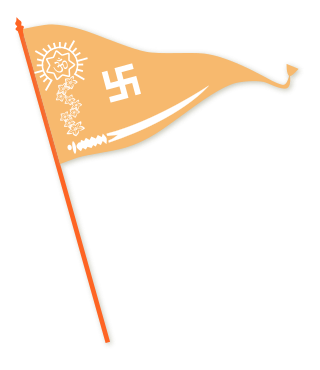
Akhil Bharatiya Hindu Mahasabha is a Hindu nationalist political party in India.
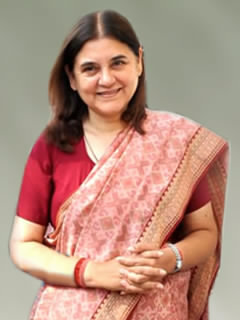
Maneka Gandhi is an Indian politician, animal rights activist, and environmentalist. She served as a member of the Lok Sabha, the lower house of the Indian parliament, and is a member of the Bharatiya Janata Party (BJP). She is the widow of Indian politician Sanjay Gandhi. Gandhi has held ministerial positions in four governments, most recently serving in Narendra Modi's government from May 2014 to May 2019.
Freedom of religion in India is a fundamental right guaranteed by Article 25–28 of the Constitution of India. Modern India came into existence in 1947 and the Indian constitution's preamble was amended in 1976, to explicitly declare India a secular state. Supreme Court of India ruled that India was already a secular state from the time it adopted its constitution, what actually was done through this amendment is to state explicitly what was earlier contained implicitly under article 25 to 28. Every citizen of India has a right to practice and promote their religion peacefully. However, there have been numerous instances of religious intolerance that resulted in riots and mob violences; notably, the 1984 Sikh Massacre in and around Delhi, 1990 Exile of Kashmiri Pandits (Brahmins) from Kashmir (Cashmere), the 1992–93 Bombay Riots in Mumbai (Bombay), the 2008 Anti-Christian riots in Odisha (Orissa) and other anti-Christian violence in India. Some perpetrators of the 1984 Sikh Massacre have not been brought to justice despite widespread condemnation.
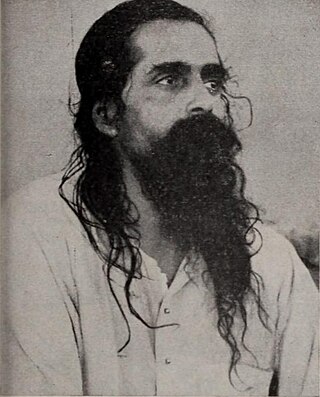
Madhav Sadashivrao Golwalkar, popularly known as Guruji, was the second Sarsanghchalak ("Chief") of the Hindutva organisation Rashtriya Swayamsevak Sangh (RSS). Golwalkar is considered one of the most influential and prominent figures among Rashtriya Swayamsevak Sangh by his followers.
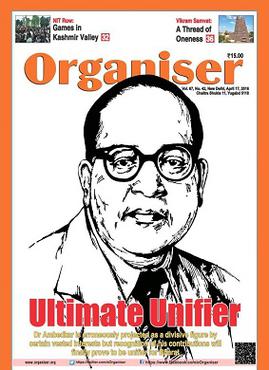
Organiser is a mouthpiece of the Hindu nationalist and voluntary organisation Rashtriya Swayamsevak Sangh (RSS). It was launched as a newspaper in 1947 in the weeks before the Partition of India. The newspaper has been edited by A. R. Nair, K. R. Malkani, L. K. Advani, V. P. Bhatia, Seshadri Chari and Dr R. Balashanker. It has promoted misinformation on many occasions.

Akhil Bharatiya Vidyarthi Parishad (ABVP) (transl. All India Students' Council) is a right-wing and a independent all India student organisation affiliated to the Hindu nationalist organisation Rashtriya Swayamsevak Sangh (RSS).It is the World’s largest Student Organization.
Madhav Vittal Kamath was an Indian journalist and broadcasting executive, and the chairman of Prasar Bharati. He worked as the editor of The Sunday Times for two years from 1967 to 1969, as Washington correspondent for The Times of India from 1969 to 1978 and also as editor of The Illustrated Weekly of India. He had also written numerous books and was conferred with the Padma Bhushan award in 2004. He was born in a brahmin family
Gandhian socialism is the branch of socialism based on the national interpretation of the theories of Mahatma Gandhi. Gandhian socialism generally centers on Hind Swaraj or Indian Home Rule authored by Gandhi.
Vishnu Ghanashyam Deshpande was an Indian politician. He was born in Mehkar, Vidarbha, Maharashtra. V.G. Deshpande was the general secretary of the Akhil Bharatiya Hindu Mahasabha.
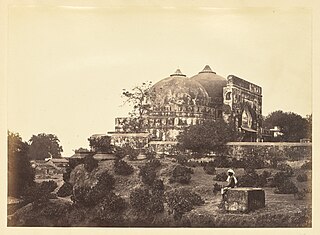
The demolition of the Babri Masjid was carried out on 6 December 1992 by a large group of activists of the Vishva Hindu Parishad and allied organisations. The 16th-century Babri Masjid in the city of Ayodhya, in Uttar Pradesh, India, had been the subject of a lengthy socio-political dispute, and was targeted after a political rally organised by Hindu nationalist organisations turned violent.
Hindu nationalism has been collectively referred to as the expression of political thought, based on the native social and cultural traditions of the Indian subcontinent. "Hindu nationalism" is a simplistic translation of Hindū Rāṣṭravād. It is better described as "Hindu polity".
These are the references for further information regarding the Sangh Parivar.
This is a bibliography of literature treating the topic of criticism of Christianity, sorted by source publication and the author's last name.
